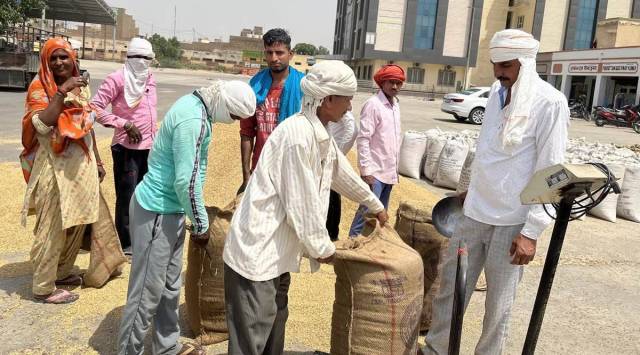With the ongoing procurement season nearing its end this year, the mandis in Haryana have registered a 42% downfall in wheat procurement when compared to the corresponding period in 2021.
The sharp decline in purchase comes at a point amid farmers expecting higher price for their produce in the market in the coming months due to Russia-Ukraine war.

Till April 26 this year, as much as 41.10 lakh MT wheat has been procured in mandis (APMCs), mainly by the government agencies while this figure was 70.41 lakh MT in 2021 during the same period.
Story continues below this ad
In 2021, total 84.93 lakh MT wheat was procured during the entire procurement season.
This year the procurement season started on April 1 which will continue till May 15. But officials are not hopeful about arrival of much wheat in the remaining period of this season.
“At maximum, the figure may reach at 50-55 lakh MT,” said an official of the Haryana Agriculture and Farmers Welfare Department.
Haryana had set a target to procure 85 lakh tonnes of wheat this Rabi season.
But the state is likely to miss the target because of less production of wheat this year and storage of the same by farmers and traders anticipating a hike in the prices following the Russia-Ukraine war.
Story continues below this ad
In recent years, this is the first time when a section of traders purchased wheat (97,062 MT) from farmers even at the government-run mandis (APMCs) too.
In 2020, private traders had purchased only 235 MT in the mandis while this figure was just 87 MT in 2021. They purchased the wheat offering up to Rs 2,331 per quintal when the government agencies procured the food grain at the rate of 2,015 per quintal (MSP) only.
Former president of All-India Rice Exporters Association Vijay Setia said: “A farmer pays 6.5 per cent charges — 2.5 per cent kachi aadhat and 2 per cent each market fees and Haryana Rural Development Fund (HRDF) – to sell food grain at the mandis. If he sells the same to the private players outside mandis then he can save the charges.
That’s what happened this year. The private traders have purchased the wheat from the farmers but have asked them to keep the produce in their homes itself. In other cases, the traders have kept the wheat at godowns too in the name of farmers.”
Normally, farmers bring their produce to the mandis to sell the same to get MSP as declared by the government. But this time, the traders had offered a premium of Rs 5-10 per quintal on the MSP but lately increased it. Private traders have been offering a marginally higher than MSP price to farmers as big wheat exporters – Russia and Ukraine – are missing from the wheat export market.
Story continues below this ad
A farmer Ram Mehar from Fatehabad said: “Because of poor financial conditions and pressure to incur expenditure for next crop, the farmers have sold the wheat either in the mandis or private traders. Anticipating a hike in prices following the Russia-Ukraine war, they may hold back nearly 5% wheat but traders may keep in their store a much higher quantity of food grain.”
Senior BKU leader Gurnam Singh Chaduni also said that only those farmers who have bigger land holdings may store the wheat for long.
The crop yield has dropped by 8-10% in the state, according to official estimates, because of the early onset of summer coupled with an exceptional rise in mercury this year.
Chaduni added that in some farms the production has gone down by 25% this year.
According to Haryana Agriculture and Farmers Welfare Minister J P Dalal, this time most of the farmers in several areas of south Haryana have sown mustard over wheat, so the problem of shortage of fodder has also arisen.









